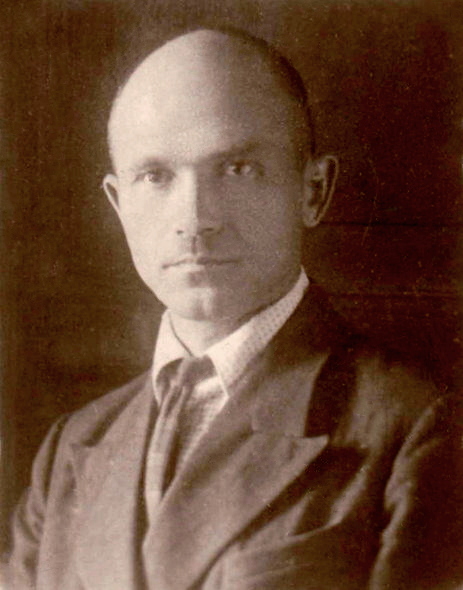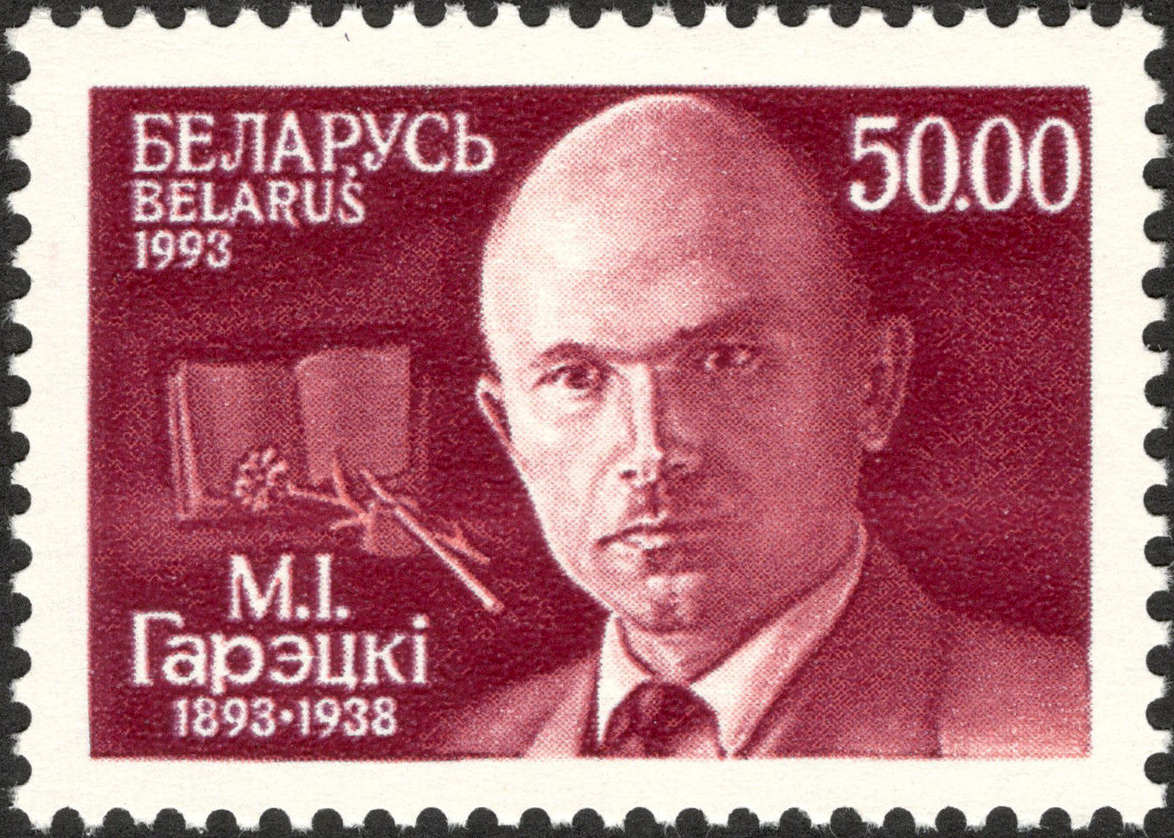Maksim Haretski on:
[Wikipedia]
[Google]
[Amazon]

 Maksim Haretski (18 February 1893 – 10 February 1938; , ), also known as Maksim Harecki and Maksim Goretsky, was a
Maksim Haretski (18 February 1893 – 10 February 1938; , ), also known as Maksim Harecki and Maksim Goretsky, was a
Maksim Harecki: biography in the Belarusian Electronic Encyclopedia
Some works by Maksim Harecki
{{DEFAULTSORT:Haretski, Maksim 1893 births 1938 deaths People from Mstsislaw district People from Mstislavsky Uyezd Belarusian male writers Belarusian-language writers Soviet literary historians Soviet male writers Russian military personnel of World War I Belarusian people of World War I Recipients of the Order of St. George of the Fourth Degree Foreign nationals imprisoned in Poland Case of the Union of Liberation of Belarus Great Purge victims from Belarus Soviet rehabilitations

 Maksim Haretski (18 February 1893 – 10 February 1938; , ), also known as Maksim Harecki and Maksim Goretsky, was a
Maksim Haretski (18 February 1893 – 10 February 1938; , ), also known as Maksim Harecki and Maksim Goretsky, was a Belarus
Belarus, officially the Republic of Belarus, is a landlocked country in Eastern Europe. It is bordered by Russia to the east and northeast, Ukraine to the south, Poland to the west, and Lithuania and Latvia to the northwest. Belarus spans an a ...
ian prose writer, journalist, activist of the Belarusian national renewal, folklorist, lexicographer, and professor. Maksim Harecki was also known by his pen-names ''Maksim Biełarus, M.B. Biełarus, M.H., A. Mścisłaŭski, Dzied Kuźma, Maciej Myška,'' and ''Mizeryjus Monus''. In his works he often appeared as ''Kuźma Batura, Liavon Zaduma.''
Maksim Harecki was born in village of Małaja Bahaćkaŭka in a peasant's family. He had two brothers – Haŭryła and Ivan.
In 1913 Harecki graduated from a college in Hory-Horki, and in 1916 from a military college in Petrograd
Saint Petersburg, formerly known as Petrograd and later Leningrad, is the second-largest city in Russia after Moscow. It is situated on the River Neva, at the head of the Gulf of Finland on the Baltic Sea. The city had a population of 5,601, ...
. During the First World War
World War I or the First World War (28 July 1914 – 11 November 1918), also known as the Great War, was a World war, global conflict between two coalitions: the Allies of World War I, Allies (or Entente) and the Central Powers. Fighting to ...
he served in the Russian Army. He was wounded on October 25, 1914, and had to recover in the military hospitals of Vilnia
The Vilnia (also Vilnelė; , ''Vilnia'' ; ) is a river primarily running through Eastern Lithuania. Its source is near the villages of and , 6 km south of Šumskas, nearby to the A3– M7 Medininkai–Kamenny Log border crossing complexes ...
, Moscow
Moscow is the Capital city, capital and List of cities and towns in Russia by population, largest city of Russia, standing on the Moskva (river), Moskva River in Central Russia. It has a population estimated at over 13 million residents with ...
and Mahilioŭ. After that, he continued to serve in the army until 1917 when he got very ill and was sent to Zheleznovodsk to recover and then left the army.
Later on, Harecki moved to Smolensk
Smolensk is a city and the administrative center of Smolensk Oblast, Russia, located on the Dnieper River, west-southwest of Moscow.
First mentioned in 863, it is one of the oldest cities in Russia. It has been a regional capital for most of ...
and studied in the Archaeological University there. At that time he started to work for local newspapers. Soon he moved to Minsk
Minsk (, ; , ) is the capital and largest city of Belarus, located on the Svislach (Berezina), Svislach and the now subterranean Nyamiha, Niamiha rivers. As the capital, Minsk has a special administrative status in Belarus and is the administra ...
and in January 1919 to Vilnia
The Vilnia (also Vilnelė; , ''Vilnia'' ; ) is a river primarily running through Eastern Lithuania. Its source is near the villages of and , 6 km south of Šumskas, nearby to the A3– M7 Medininkai–Kamenny Log border crossing complexes ...
, where he began working in the Belarusian Gymnasium of Vilnia and some newspapers.
In 1919 he married Leaniła Čarniaŭskaja in Vilnia. His wife worked as a teacher in the Belarusian Gymnasium of Vilnia. They had a son Leanid who died in the battle of Leningrad. Also, they had a daughter, Halina.
In January 1922 Harecki was arrested by Polish authorities as a political criminal and was put into the infamous Łukiszki prison in Vilnia
The Vilnia (also Vilnelė; , ''Vilnia'' ; ) is a river primarily running through Eastern Lithuania. Its source is near the villages of and , 6 km south of Šumskas, nearby to the A3– M7 Medininkai–Kamenny Log border crossing complexes ...
. Following mass protests of the Belarusian minority, he was released and sent to Soviet-controlled East Belarus. There he worked as a language and literature professor at some universities. He was a member of the Inbelkult.
In 1929, along with other Belarusian activists, Harecki became a target of a defamation campaign in the Soviet state media. He was arrested by the Soviets in July 1930 and accused of being a member of the Belarusian Liberation Union, a separatist organization. In April–May 1931 he was sentenced to five years of prison in Viatka. During this time Harecki wrote a lot of literature works. On November 4, 1937, he was arrested again and later on shot in the Great Purge
The Great Purge, or the Great Terror (), also known as the Year of '37 () and the Yezhovshchina ( , ), was a political purge in the Soviet Union that took place from 1936 to 1938. After the Assassination of Sergei Kirov, assassination of ...
. He was rehabilitated in 1957.
Today Maksim Harecki is considered a classic of Belarusian literature
Belarusian literature () is the writing produced, both prose and poetry, by speakers (not necessarily native speakers) of the Belarusian language.
History Pre-17th century
Belarusian literature was formed from the common basis of Kievan Rus' ...
. His books were translated into Ukrainian, Russian
Russian(s) may refer to:
*Russians (), an ethnic group of the East Slavic peoples, primarily living in Russia and neighboring countries
*A citizen of Russia
*Russian language, the most widely spoken of the Slavic languages
*''The Russians'', a b ...
, Polish
Polish may refer to:
* Anything from or related to Poland, a country in Europe
* Polish language
* Polish people, people from Poland or of Polish descent
* Polish chicken
* Polish brothers (Mark Polish and Michael Polish, born 1970), American twin ...
, and German
German(s) may refer to:
* Germany, the country of the Germans and German things
**Germania (Roman era)
* Germans, citizens of Germany, people of German ancestry, or native speakers of the German language
** For citizenship in Germany, see also Ge ...
.
References
External links
Maksim Harecki: biography in the Belarusian Electronic Encyclopedia
Some works by Maksim Harecki
{{DEFAULTSORT:Haretski, Maksim 1893 births 1938 deaths People from Mstsislaw district People from Mstislavsky Uyezd Belarusian male writers Belarusian-language writers Soviet literary historians Soviet male writers Russian military personnel of World War I Belarusian people of World War I Recipients of the Order of St. George of the Fourth Degree Foreign nationals imprisoned in Poland Case of the Union of Liberation of Belarus Great Purge victims from Belarus Soviet rehabilitations